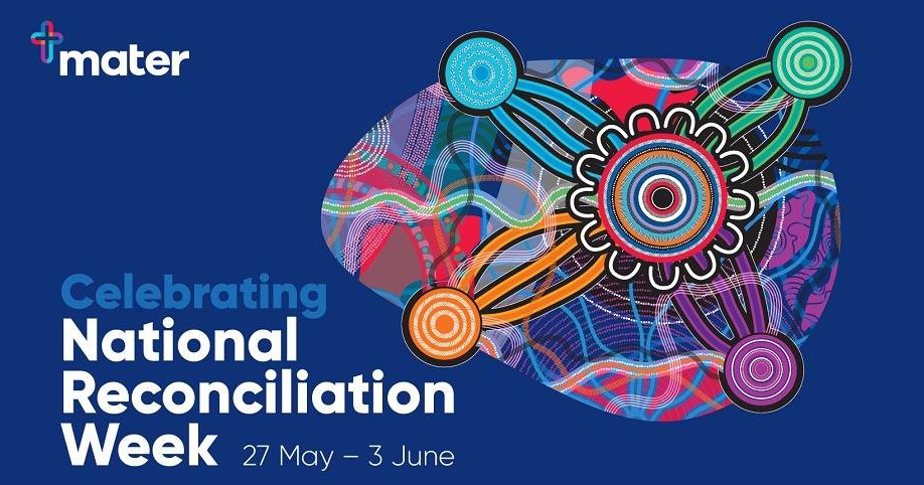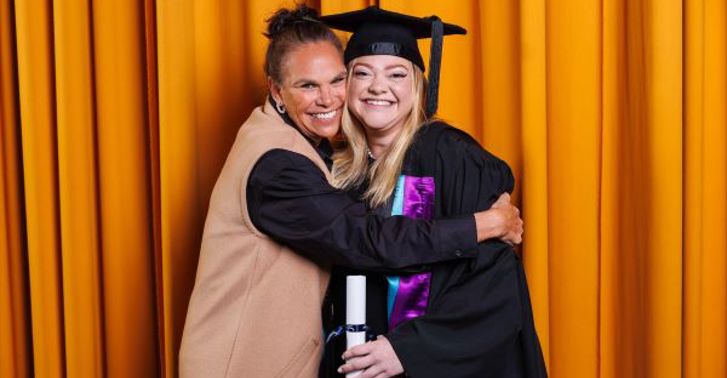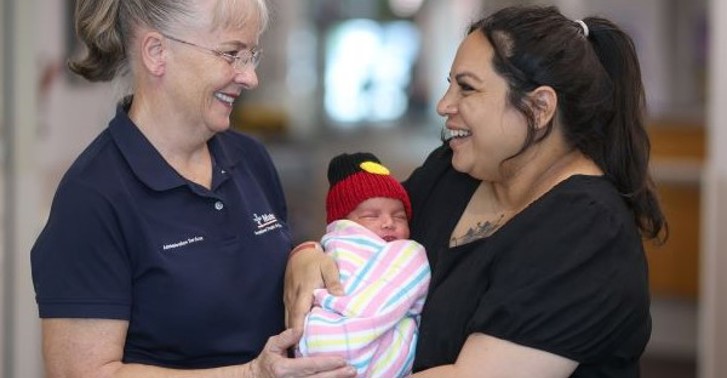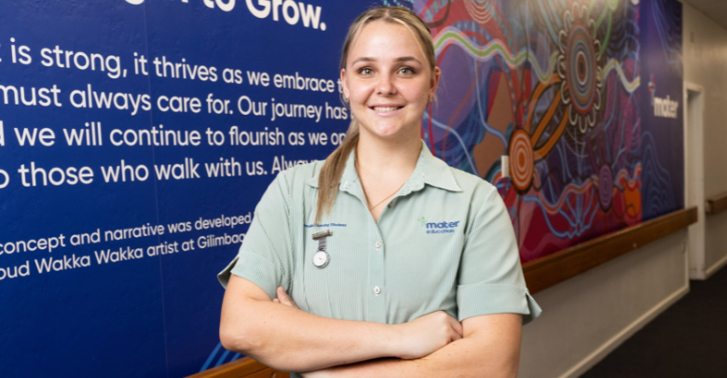Categories:

This week is National Reconciliation Week – a time for all Australians to learn about our shared histories, cultures, and achievements, and to explore how each of us can contribute to achieving reconciliation in Australia.
For us at Mater, National Reconciliation Week (NRW) is a week of great significance.
The theme for National Reconciliation Week 2024 is "Now More Than Ever" which serves as a reminder that the fight for justice and the rights of Aboriginal and Torres Strait Islander people will — and must — continue.
In line with this, we are proud to embark on the next phase our reconciliation journey as an organisation, with the release of our Innovate Reconciliation Action Plan.
This plan builds upon the important work we’ve carried out since commencing our Reconciliation Action Plan, nearly three years ago, and serves as a roadmap for all Mater People to ensure our continued commitment to reconciliation across the organisation.
Read our Innovate Reconciliation Action Plan here
According to Mater CEO and RAP Steering Committee Co-chair Peter Steer, Mater’s Innovate RAP will inspire Mater People to be a catalyst for further change.
“We are committed to achieving meaningful progress in all five of Reconciliation Australia’s priority dimensions: Race Relations; Equality and Equity; Institutional Integrity; Unity, and Historical Acceptance,” says Dr Steer.
“By fostering a culturally safe and inclusive workplace that embraces diversity and celebrates our national heritage, Mater can provide an environment for the growth of authentic and genuine reconciliation amongst all Mater People—our staff, students and volunteers—as well as our patients and the communities we serve,” he says.
RAP Program Manager and proud Wiradjuri woman Jo Jones believes it will further contribute to advancing reconciliation, by supporting Mater to develop respectful relationships and create meaningful opportunities with and for Aboriginal and Torres Strait Islander peoples.
“I see Mater’s reconciliation journey as an opportunity to spark positive change and bring together two parties where there has been historic wrongdoing, that we must put right for future generations,” she says.
“Our Innovate RAP serves to bring about new processes, services, ideas and solutions that will have a positive impact on the health and employment outcomes for my fellow First Nations people, marking the way for us to make a difference and close that gap.”
By living out Mater’s Innovate Reconciliation Action Plan, our goal is that all Mater People – our staff, students, and volunteers – become culturally aware and conscious of the efforts we can make to close the gap and foster reconciliation.
As an organisation, we will realise this goal by building on relations with community stakeholders, while striving to improve accessibility to culturally safe healthcare services, education and employment opportunities, and self-determined health research.
Now, more than ever, we need reconciliation.
National Reconciliation Week
Mater is excited to celebrate reconciliation this year through the following initiatives:
- Acknowledgement of Country lanyard cards will be distributed to all Mater People this week. These cards will serve to reminds us of the significance of Country to Traditional Owners and Custodians of the lands upon which we work. We invite you to refer to these for inspiration when delivering your own Acknowledgement of Country at meetings and events.
- RAP artwork and Acknowledgement of Country email signatures will be automatically disseminated across the organisation through Outlook.
- We are also pleased to make available online A Guide to Cultural Protocols – an internal resource for Mater People to better understand protocols, ceremonies and symbols of cultural significance and how to incorporate them into Mater events, where is it appropriate to do so.
- All new allied health patients during National Reconciliation Week will be gifted a tote bag featuring Mater’s Reconciliation Action Plan (RAP) artwork.
Some teams have also arranged their own small celebrations to mark National Reconciliation Week.
FAQs
What is National Reconciliation Week?
National Reconciliation Week —held every year from 27 May to 3 June—is a time for all Australians to learn about our shared histories, cultures, and achievements, and to explore how each of us can contribute to achieving reconciliation in Australia.
What’s the significance of 27 May and 3 June?
27 May marks the anniversary of the 1967 referendum when Australians voted to remove clauses in the Australian Constitution that discriminated against Aboriginal and Torres Strait Islander peoples.
3 June marks the historic 1992 Mabo decision in which the High Court of Australia recognised native title—the recognition that Aboriginal and Torres Strait Islander peoples’ rights over their lands did survive British colonisation.
The day before National Reconciliation Week, 26 May, is National Sorry Day, which was first held in Sydney in 1998 and is now commemorated nationally to remember and honour the Stolen Generations.
What is a Reconciliation Action Plan?
Since 2006, Reconciliation Action Plans (RAPs) have enabled organisations to sustainably and strategically take meaningful action to advance reconciliation. They are a collaborative partnership with Reconciliation Australia, designed specifically for Australian workplaces.
Based around the core pillars of relationships, respect and opportunities, RAPs provide tangible and substantive benefits for Aboriginal and Torres Strait Islander peoples, increasing economic equity and supporting First Nations self-determination.
The four RAP types – Reflect, Innovate, Stretch and Elevate – allow organisations to continuously develop their reconciliation commitments. Each type of RAP is designed to suit an organisation at different stages of their reconciliation journey.
How else can I get involved in National Reconciliation Week?
Visit the Reconciliation Australia website for more information and to discover what activities and events are taking place in your local area during National Reconciliation Week. On a personal level, you can think about what you can do locally and take the time to learn about the rich Aboriginal and Torres Strait Islander cultures that exists in Australia.
And, importantly, find the time to talk with your family and friends about why it’s important for all Australians to build respectful relationships with each other, and especially with Aboriginal and Torres Strait Islander peoples.
What can I do for the rest of year?
While National Reconciliation Week is an excellent time to think about these issues, you can still take action through the year to work towards reconciliation.
Our state-wide RAP Reference Groups meet on the first Tuesday of every month. If you wish to share your thoughts and initiatives, please contact your local group representative, as found on the intranet. To share your ideas or to express your interest, please contact RAP@mater.org.au
For information about events and initiatives in the community, visit www.reconciliation.org.au



